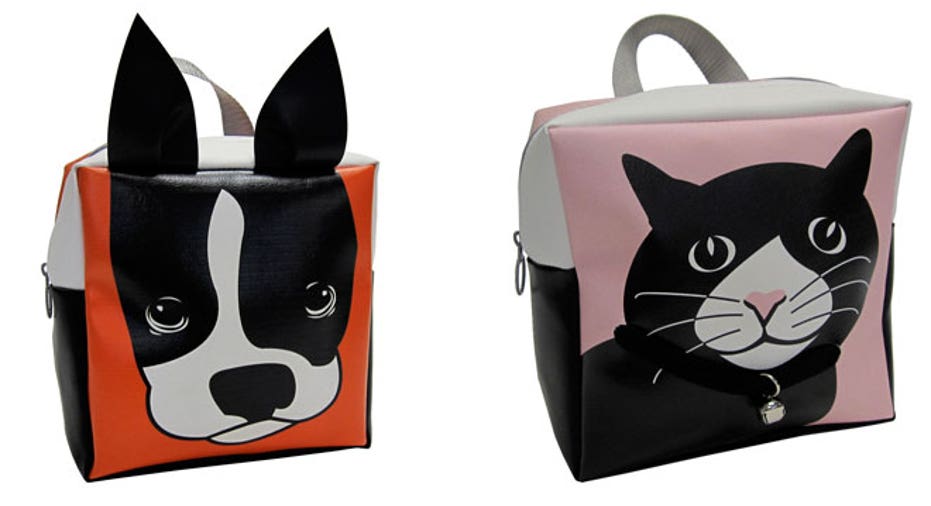Mompreneur Turns Down Global Business to Keep 'Made in the USA' Label

When Cathy Berse-Hurley started making her 4-year-old twin boys handmade backpacks for school in 1996, other kids and parents took interest. She soon also began making lunch boxes, and selling her popular animal-themed wares at street and craft fairs, as well as big events like the New York International Gift Fair and New York Toy Fair. Her business took off and, in January 2002, she took the business wholesale, selling her bags in specialty retail stores, kids’ stores, boutiques, museum stores, as well as large department stores like Macy’s, Nieman Marcus, Saks and Nordstrom.
Berse-Hurley said she then picked up international distributors from Europe and Japan at the large toy and gift shows.
“I pretty much was doing international business. It was kind of cool. I found that they appealed to Asian culture really well,” said Berse-Hurley, the founder and designer of CBHstudio in Massachusetts. “It wasn’t an issue of trying to get people to buy my bags - everybody loved them.”
But despite all the success, this creative entrepreneur began to hit financial snags - snags that stemmed from competitors using cheaper, non-American labor.
“I was getting bigger and bigger but I still loved doing it [business] in the U.S. and keeping manufacturing here,” Berse-Hurley said. But going global meant profit-slashing, because of high shipping, customs and other costs.
“The more I grew, the less money I was making and being able to have a margin in the wholesale end of things became impossible,” she said.
The problem was, whereas Berse-Hurley was self-financed, designing all of her own bags and having them made by American workers in a U.S. factory, she said all of her competitors were having their similar products made overseas by cheap, foreign labor.
”My wholesale cost was only a few dollars off of their [competitors’] retail because they’re making their product for a third the cost,” Berse-Hurley. “It’s not necessarily the materials that are cheaper in China, it’s the labor cost. ...My labor costs in the U.S. are still going to be constant, whether I make five bags or 50 bags or 5,0000 bags.”
“That’s the battle I’ve been trying to win for 15 years.”
'I Do Not Want to Go to China'
Berse-Hurley tried several different business strategies to grow her profit margin while still keeping business here at home. For example, she found a company in Pennsylvania that would cut, screen-print, stitch and otherwise assemble the bags all in-house, cutting the costs of having multiple companies do the same jobs by about one-third - but that was still three times more than what it would have cost her to do the same job overseas. But nothing brought her into the black.
“One day I [thought], ‘You know, this is not working and I’m frustrated by it. I do not want to go to China.’ I just didn’t want to be another brand that was importing stuff from China,” Berse-Hurley said. “I didn’t feel good playing that game, I just couldn’t do it.”
Since the centerpiece of CBHstudio’s business plan was to keep its operation all-American, Berse-Herley said she realized she had to do something drastic. So, in January 2012, she started selling her bags directly to consumers online. This way, she can keep designing her own bags (she couldn’t keep up with all the wholesale orders and still design the bags herself), keep the boutique-feel of her business, continue her operations in the U.S. and, oddly enough, says she is making more of a profit than when her bags could be found in major department stores around the globe.
“I keep getting calls from stores asking ‘please, please sell it to me,’” Berse-Hurley says. But “I just felt like I couldn’t go on the way I was going on. I’m guilty of it, too, but we’ve become spoiled by inexpensive goods from overseas. Even though people want to buy ‘Made in the USA,’ when they’re faced with the kid’s backpack they might grow out of or they might want a new one next year, you can only charge so much. So I try to keep my prices somewhat competitive with my competition.”
In addition to designing her own bags, Berse-Hurley also has about eight to 10 graphic design clients to supplement her income stream; she offers product development and merchandising services she has acquired through her own business to them, as well. She also may license her designs for stationary, giftware or other items.
Berse-Hurley says lawmakers need to keep even the smallest of America’s businesses in mind when they develop policy - and America needs to back off its dependence on the cheapest goods.
“I always felt there should be something done to level the playing field” with foreign labor competitors, Berse-Hurley said. “But then, the U.S. public is so used to low prices, I’m not sure that would fly. I’m not sure what could be done but I think as the public becomes more aware of companies that are trying to make in the U.S. - there are people out there trying to support that … and there are blogs and Web sites and Facebook pages that list businesses like mine - that’s really helpful.”



















